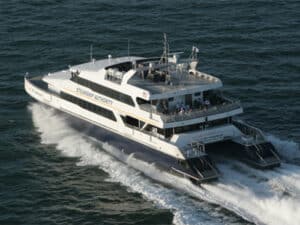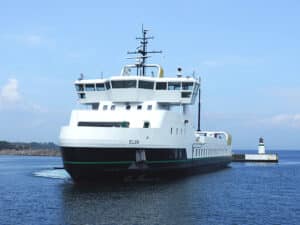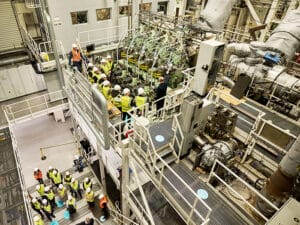
North Star’s new 2024 ESG report shows big advances in sustainability
Written by Nick Blenkey
“Our ESG performance isn’t simply a compliance exercise, it’s integral to how we make decisions,” says North Star’s strategic projects manager Jen Redman.
Aberdeen, Scotland-headquartered offshore vessel specialist North Star has released its 2024 ESG report that shows that the company has made major advances in sustainability, including an18% reduction in fleet CO2 emissions.
North Star says that a £400 million (about $546 million) ongoing commitment as part of its ESG strategy, combined with a £1.8 million (about $2.6 million) investment in crew training last year, has delivered significant progress in its transition to operating a net zero fleet by 2045.
North Star is the U.K.’s largest integrated ship owner-operator with a current fleet of 48 vessels. Findings from its 2024 ESG report, include an 18% reduction in fleet-wide carbon intensity compared to 2022, alongside a 15% year-on-year cut in Scope 1 greenhouse gas (GHG) emissions.
The 12-month analysis in the 2024 ESG report illustrates the successful deployment of the company’s first three service operation vessels (SOVs) under long-term charter agreements. Since 2024, a fourth SOV has been operational at the Dogger Bank Wind Farm, while the firm’s first methanol-ready SOV has commenced work under a European contract. Three more SOVs are scheduled for delivery in 2025 and 2026.
Other insights from the ESG report include:
- 13% increase in headcount since 2022, supporting strategic growth
- Ongoing investment in mental health and wellbeing initiatives
- Improved diversity and inclusion metrics across onshore and offshore teams
- Recognized with the British Safety Council’s 5 Star Audit, International Safety Award and Sword of Honour for health and safety excellence
- More than doubled its EBITDA from offshore wind in the past year, with a run rate EBITDA of 69% through contracts already secured
- £108.1 million of investment in new offshore wind vessels during 2024 alone, contributing to a total of £500 million since entering the market in 2021.
“Our ESG performance isn’t simply a compliance exercise, it’s integral to how we make decisions,” says North Star’s strategic projects manager Jen Redman. “By embedding sustainability into operational decision-making, we’ve cut emissions, improved efficiency and secured major new charters.”
These improvements have been driven by the transition towards new, more fuel-efficient vessels as new SOVs are delivered, a focus on efficiency in vessel route planning and an awareness campaign which drives ships’ crew to place an emphasis on fuel efficiency in operational decision making.
North Star’s growing SOV fleet is designed with hybrid propulsion, battery-ready architecture and green methanol compatibility, enabling seamless integration of zero-emission technologies as they scale. AI-enabled vessel planning and predictive maintenance capabilities, a fully integrated ERP and emissions monitoring systems are already live across the fleet, allowing the North Star team to identify and encourage efficiency across all operations.
“Operating in one of the world’s most essential, and emissions intensive sectors brings with it a profound responsibility to lead the transition to cleaner, more sustainable operations,” says North Star CEO Gitte Gard Talmo. “Last year we took significant steps to reduce our environmental footprint across all areas
of the business from vessel design to crew behavior. This laser-sharp approach has delivered measurable decarbonization, led not just by our people but the on-going digitalization for fleet management that we have introduced.”
In 2024, average carbon intensity across the fleet fell to 1.7 tonnes CO2/GRT/year, from 2.1 tonnes in 2022. The company is aiming for 1.5 tonnes by 2028.
- Download the North Star 2024 ESG report HERE




